The Golem
Lạ, hiếm, phong trần, tã: Vớ được tại tiệm sách cũ
THE GOLEM, p. 111
Joshua Trachtenberg, in Jewish Magic and Superstition, writes that the German Hasidim used "the word golem (literally, shapeless or lifeless matter) to designate a homunculus created by the magical invocation of names, and the entire cycle of golem legends may be traced back to their interest."
Line 20. Though Judah Low, the seventeenth-century Jewish rabbi from Prague, is credited with making the Golem, according to Trachtenberg the "legends of the golem were transferred ... to R. Judah Low b. Bezalel, without any historical basis." It turns out that John Hollander, the poem's translator, is a descendant of Rabbi Low (or Loew); after making his translation, Hollander was inspired to write his own Golem poem, "Letter to Borges: A Propos of the Golem," which admirably complements the translation. Hollander's poem is printed in his book The Night Mirror.
39. Gershom Scholem is the distinguished Jewish scholar and author of Major Trends in Jewish Mysticism.
Borges' interest in the legend of the Golem dates from an early acquaintance with Gustav Meyrink's Der Golem, the first prose work in German Borges ever read. See Borges' article on "The Golem" in The Book of Imaginary Beings, pp. 112-14.
Borges was named Director of the Argentine National Library after the fall of Peron in 1955.
Line 37. Paul Groussac (1848-1929) had been a former director of the Biblioteca Nacional and was also a historian and critic whose prose style Borges has greatly admired. A short eulogy, written after Groussac's death, is collected in Borges' Discusión
After writing the poem, Borges discovered that Jose Marmol, the nineteenth-century poet and novelist who directed the National Library until his death in 1871, had also gone blind.
Imaginary Beings Book
The kabbalists would have approved of that verdict: one of the secrets they sought within the divine text was how to create living beings. It was said of demons that they could shape large, solid creatures like the camel, but not finely wrought, delicate ones, and Rabbi Eliezer denied them the ability to produce anything smaller than a grain of barley. "Golem" was the name given the man created out of a combination of letters; the word literally means" an amorphous or lifeless substance." In the Talmud (Sanhedrin, 65b), we read:
If the righteous desired it, they could be creators, for it is written that ... [by means of the Sefer Yetsirah, Book of Creation *], Rabbah created a man, and sent him to Rab Zera. Rab Zera spoke to him, but received no answer. Therefore he said unto him: "Thou art a creature of the magicians. Return to thy dust."
R. Hanina and R. Oshaia spent every Sabbath eve in studying the "Laws of Creation," by means of which they created a third-grown calf, (a) and ate it. (b)
We owe the fame of the Golem in the West to the Austrian novelist Gustav Meyrink, who wrote the following words in the fifth chapter of his dreamlike work Der Golem:
The original story harks back, so they say, to the seventeenth century. With the help of an ancient formula, a rabbi is said to have put together an automatic man and used it to help ring the bells in the Synagogue and for all kinds of other menial work. But he hadn't made it into a proper man; it was more like a kind of animated vegetable, really. What life it had, too, so the story runs, only derived from a magic prescription placed behind his teeth each day, that drew down to itself what was known as "the free sidereal strength of the universe." And as, one evening, before evening prayers, the rabbi forgot to take the prescription out of the Golem's mouth, the figure fell into a frenzy, and went raging through the streets like a roaring lion, seeking whom it might devour. At last the rabbi was able to secure it, and he then destroyed the formula. The figure fell to pieces. The only record left of it was the miniature clay figure that was shown to the people within the old Synagogue.
Eleazar of Worms has preserved the formula for making a Golem. The details of the enterprise require twenty-three columns in folio and demand that the maker know" the alphabets of the two hundred twenty-one gates" that must be repeated over each of the Golem's organs. On its forehead one must tattoo the word "EMET" which means "truth." In order to destroy the creature, one would efface the first letter, leaving the word "MET," which means "death."
* "By means of mystic combinations of the Divine Name [Talmudic note].
(a) I.e., a calf that has reached one-third of its full growth; others interpret: (i) in its third year;
(b) Similarly, Schopenhauer writes: "On page 325 of the first volume of his Zauberbibliothek Horst summarizes in the following way the doctrine of the English visionary Jane Leade: 'Whosoever possesses magical power may, at his will, rule and renew the mineral, plant, and animal kingdoms; thus, if a few wizards came to an agreement, all Creation might return to its paradisal state.'" (On the Will in Nature, VII)
The Sphinx found on Egyptian monuments (called "Androsphinx" by Herodotus, to distinguish it from the Greek creature) is a recumbent lion with the head of a man; it is believed to represent the authority of the pharaoh, and it guarded the tombs and temples of that land. Other Sphinxes, on the avenues of Karnak, have the head of a lamb, the animal sacred to Amon. Bearded and crowned Sphinxes are found on monuments in Assyria, and it is a common image on Persian jewelry. Pliny includes Sphinxes in his catalog of Ethiopian animals, but the only description he offers is that it has "brown hair and two mammae on the breast."
The Greek Sphinx has the head and breasts of a woman, the wings of a bird, and the body and legs of a lion. Others give it the body of a dog and the tail of a serpent. Legend recounts that it devastated the countryside of Thebes by demanding that travelers on the roads solve riddles that it put to them (it had a human voice); it devoured those who could not answer. This was the famous question it put to Oedipus, son of Jocasta: "What has four feet, two feet, or three feet, and the more feet it has, the weaker it is?" (1)
Oedipus answered that it was man, who crawls on four legs as a child, walks upon two legs as a man, and leans upon a stick in old age. The Sphinx, its riddle solved, leapt to its death from a mountaintop.
In 1849 Thomas De Quincey suggested a second interpretation, which might complement the traditional one. The answer to the riddle, according to De Quincey, is less man in general than Oedipus himself, a helpless orphan in his morning, alone in the fullness of his manhood, and leaning upon Antigone in his blind and hopeless old age.
(1)
This is apparently the oldest version of the riddle. The years have added the metaphor of the life of man as a single day, so that we now know the following version of it: "What animal walks on four legs in the morning, two legs at midday, and three in the evening?
and wandering three-legged down the hollow
reaches of evening: thus did the sphinx,
the eternal one, regard his restless fellow,
mankind; and at evening came a man
who, terror-struck, discovered as in a mirror
his own decline set forth in the monstrous image,
his destiny, and felt a chill of terror.
We are Oedipus and everlastingly
we are the long tripartite beast; we are
all that we were and will be, nothing less.
It would destroy us to look steadily
at our full being. Mercifully God grants us
the ticking of the clock, forgetfulness.
-A.S.T.
J.L. Borges [Penguin ed]
And wandering on three legs in the deserted
Spaces of afternoon, thus the eternal
Sphinx had envisioned her changing brother
Man, and with afternoon there came a person
Deciphering, appalled at the monstrous other
Presence in the mirror, the reflection
Of his decay and of his destiny.
We are Oedipus; in some eternal way
We are the long and threefold beast as well-
All that we will be, all that we have been.
It would annihilate us all to see
The huge shape of our being; mercifully
God offers us issue and oblivion.
[John Hollander]
Thomas Di Giovanni ed
Ba chân, lang thang, nơi không gian hổng vào lúc xế trưa
Đó là viễn ảnh của Nhân Sư về người anh em con người của Nàng
Vào lúc hoàng hôn, chàng khám phá ra, như trước tấm gương
Sự tàn tạ và số mệnh của mình
Chúng ta là Ơ Đíp, theo 1 cách miên viễn hằng hằng
Chúng ta là con thú, dài dài, ba nếp gấp, chứ còn ai nữa ở đây?
Tất cả là như thế, và sẽ là như thế, ngoài ra là hư vô
Nó sẽ huỷ diệt chúng ta khi nhìn suốt 1 cõi của mình
May mắn thay
Chúa bèn ban chúng ta
Tiếng tích tắc của cái đồng hồ
Và
Quên lãng
that He will not destroy the city of Sodom if ten just men can be found within it.
The Arabs have an analogous figure, the Qutb, or "saint."
Note: Ấn bản mới có tí khác ấn bản cũ, GCC được coi là "Thánh"!
The Lamed Wufniks
The Moslems have an analogous personage in the Kutb.

Họ là những tên què gánh tội, Lamed Wufniks.
Họ không biết nhau, và rất ư là nghèo khổ.
Nếu có 1 tên biết rằng mình là tên què gánh tội, là bèn lập tức, ngỏm củ tỏi.
Và một người khác, có lẽ ở đâu đó trên thế giới, thế chỗ anh ta.
Không có 36 tên cà chớn này, là liền lập tức, Thượng Đế xóa sổ thế giới.
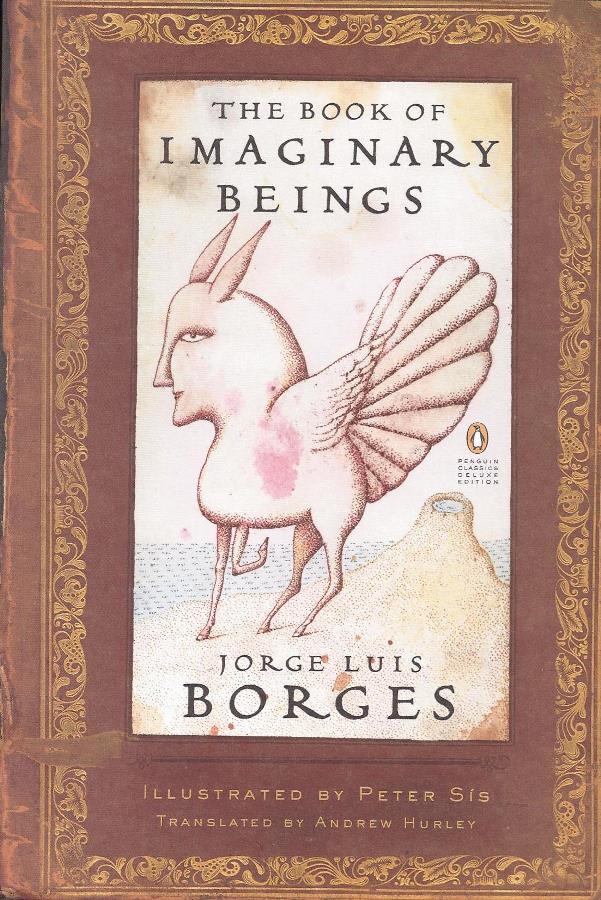
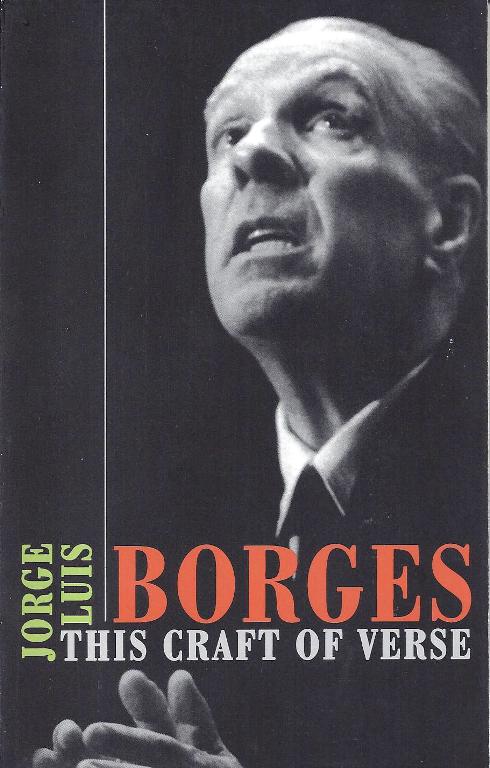
In the Cratylus) the archetype of its thing,
Among the letters of ring, resides the ring,
And in the word Nile all the Nile remains.
Then, made up of vowels and consonants,
Encoding God's essence, should exist some Name
Whose exact syllables and letters frame
Within them, terribly, Omnipotence.
Adam and all the stars had known it, placed
There in the Garden. The corrosive rust
Of sin (cabalists say) has long effaced
The Name that generations since have lost.
Human innocency and human guile
Are boundless: it is known that a day came
When the Chosen People pursued the Name
Over the wakeful ghetto's midnight oil.
Unlike the way of those who, as in fog,
Beam a dim shadow in dim history,
Green and alive remains the memory
Of Judah, the Hohe Rabbi Low of Prague.
Yearning to know that which the Deity
Knows, the Rabbi turned to permutations
Of letters in complicated variations,
And finally pronounced the Name which is the Key,
The Entry Gate, the Echo, Host, and Mansion,
Over a dummy at which, with sluggish hand,
He labored hard that it might understand
Secrets of Time, Space, Being, and Extension.
The simulacrum raised its heavy, lowered
Eyelids and perceived colors and forms;
It understood not; lost in loud alarms,
It started to take groping paces forward.
And like ourselves, it gradually became
Locked in the sonorous meshes of the net
Of After, Before, Tomorrow, Meanwhile, Yet,
Right, Left, You, Me, and Different and Same.
(The cabalist from whom the creature took
Its inspiration called the weird thing Golem-
But all these matters are discussed by Scholem
In a most learned passage in his book.)
The rabbi revealed to it the universe
(This is my foot; that's yours; this is a log)
And after years of training, the perverse
Pupil managed to sweep the synagogue.
Perhaps there was a faulty text, or breach
In the articulation of the Name;
The magic was the highest-all the same,
The apprentice person never mastered speech.
Less a man's than a dog's, less a dog's, well,
Even than a thing's, the creature's eyes
Would always turn to follow the rabbi's
Steps through the dubious shadows of his cell.
Something eerie, gross, about the Golem,
For, at his very coming, the rabbi's cat
Would vanish. (The cat cannot be found in Scholem;
Across the years, I divine it, for all that.)
Toward God it would extend those filial palms,
Aping the devotions of its God,
Or bend itself, the stupid, grinning clod,
In hollow, Orientalized salaams.
The rabbi gazed on it with tender eyes
And terror. How (he asked) could it be done
That I engender this distressing son?
Inaction is wisdom. I left off being wise.
To an infinite series why was it for me
To add another integer? To the vain
Hank that is spun out in Eternity
Another cause or effect, another pain?
At the anguished hour when the light gets vague
Upon his Golem his eyes would come to rest.
Who can tell us the feelings in His breast
As God gazed on His rabbi there in Prague?
[John Hollander]
If, as the Greek maintains in the Cratylus,
a name is the archetype of a thing,
the rose is in the letters that spell rose
and the Nile entire resounds in its name's ring.
So, composed of consonants and vowels,
there must exist one awe-inspiring word
that God inheres in-that, when spoken, holds
Almightiness in syllables unslurred.
Adam knew it in the Garden, so did the stars.
The rusty work of sin, so the cabbalists say,
obliterated it completely;
no generation has found it to this day.
The cunning and naivete of men
are limitless. We know there came a time
when God's people, searching for the Name,
toiled in the ghetto, matching rhyme to rhyme.
One memory stands out, unlike the rest-
dim shapes always fading from time's dim log.
Still fresh and green the memory persists
of Judah Le6n, a rabbi once in Prague.
Thirsty to know things only known to God,
Judah León shuffled letters endlessly,
trying them out in subtle combinations
till at last he uttered the Name that is the Key,
the Gate, the Echo, the Landlord, and the Mansion,
over a dummy which, with fingers wanting grace,
he fashioned, thinking to teach it the arcana
of Words and Letters and of Time and Space.
The simulacrum lifted its drowsy lids
and, much bewildered, took in color and shape
in a floating world of sounds. Following this,
it hesitantly took a timid step.
Little by little it found itself, like us,
caught in the reverberating weft
of After, Before, Yesterday, Meanwhile, Now,
You, Me, Those, the Others, Right and Left.
That cabbalist who played at being God
gave his spacey offspring the nickname Golem.
(In a learned passage of his volume,
these truths have been conveyed to us by Scholem.)
To it the rabbi would explain the universe-
"This is my foot, this yours, this is a clog"-
year in, year out, until the spiteful thing
rewarded him by sweeping the synagogue.
Perhaps the sacred name had been misspelled
or in its uttering been jumbled or too weak.
The potent sorcery never took effect:
man's apprentice never learned to speak.
Its eyes, less human than doglike in their look,
and even less a dog's than eyes of a thing,
would follow every move the rabbi made
about a confinement always gloomy and dim.
Something coarse and abnormal was in the Golem,
for the rabbi's cat, as soon as it moved about,
would run off and hide. (There's no cat in Scholem
but across the gulf of time I make one out.)
Lifting up to its God its filial hands,
it aped its master's devotions-even the least-
or, with a stupid smile, would bend far over
in concave salaams the way men do in the East.
The rabbi watched it fondly and not a little
alarmed as he wondered: "How could I bring
such a sorry creature into this world
and give up my leisure, surely the wisest thing?
What made me supplement the endless series
of symbols with one more? Why add in vain
to the knotty skein always unraveling
another cause and effect, with not one gain?"
In his hour of anguish and uncertain light,
upon his Golem his eyes would come to rest.
Who is to say what God must have been feeling,
Looking down and seeing His rabbi so distressed?
-A.S.T.
[Penguin ed]
J.L. Borges
Note: Trong 1 bài viết hồi còn giữ mục Tạp Ghi cho tờ Văn Học, Gấu có đi 1 bài về Borges, từ 1 cái nguồn tiếng Tẩy, và có dịch từ Golem, là Phôi Thai.
Nhảm!
Golem là tên 1 con vật tưởng tượng, và nó có nghĩa - "Golem" was the name given the man created out of a combination of letters; the word literally means" an amorphous or lifeless substance." - và là tên 1 bài thơ của Borges.
Để tạ lỗi , lần này, đi 1 bài trong Những Con Vật Tưởng Tượng, trong có con “Golem”, và 1 bài thơ của Borges, có tên là Golem.
Ở Crayle, người Hy-lạp - liệu anh ta có lầm không? -
Khi nói chữ là mẹ của sự vật:
Trong những con chữ hồng có mùi thơm của hoa hồng,
Và dòng Nil luồn lách qua những con chữ của từ Nil.
Vậy thì có một Cái Tên khủng khiếp, từ đó yếu tính
của Thượng Đế được mã hóa - và đó là một từ của con người,
Bảng mẫu tự đánh vần, bàn tay ghi lại;
Kẻ nói lên có Sức Mạnh-Toàn Năng.
Những ngôi sao biết Cái Tên này. Adam cũng vậy,
Ở Khu Vườn; nhưng liền đó, anh ngỡ ngàng và hoang mang:
Tội lỗi đục gỉ anh ta, những người thần bí giáo bảo vậy;
Mọi dấu vết đến đây là ngưng. Như thế đấy.
Jorge Luis Borges Thi Phẩm (1925-1965).
(Theo bản tiếng Pháp của Nestor Ibarra, Gallimard). (1)
(1)
Dans Cratyle, le Grec - et se trornperait-il ? _
Dit que le mot est l'archétype de la chose:
Dans les lettres de rose embaume la fleur rose,
Et le Nil entre en crue aux lettres du mot Nil.
Un Nom terrible existe donc, par quoi l'essence
De Dieu même est chiffrée - et c'est un mot humain,
Qu'épelle l'alphabet, que peut tracer la main;
Celui qui le prononce a la Toute-Puissance.
Les étoiles savaient ce Nom. Adam aussi,
Au Jardin; mais bientôt il s'étrange et se brouille :
Le péché, disent les cabalistes, le rouille ;
Toute trace s'en perd à la fin. C'est ainsi.
Mais la candeur de l'homme et sa soif de merveilles
Et son art sont sans fond. Un jour, le peuple élu
Tenta de retrouver le vocable absolu ;
Toute la juiverie y consumait ses veilles.
C'est ici que Juda Léon va survenir,
Vive et verte mémoire, et non point ombre vague
A peine insinuée au vague devenir :
II est resté, Juda Léon, rabbin de Prague.
Juda Leon saura ce que Dieu sait. Brulé
De génie, il ajoute, il retranche, il permute
Les lettres - et l'emporte en fin de haute lutte.
II a trouvé Ie Nom. Et ce Nom est la Clé,
Est l'Echo, le Palais, et l'Hôte, et les Fenêtres.
Un pantin faconné d'une grossière main.
Par le Nom recoit vie: il connaitra demain
Les arcanes du Temps, de l'Espace et des Lettres.
Levant sur l'univers des regards somnolents,
L'hominien percut des formes confondues
A des couleurs, et dans une rumeur perdues ;
Novice, il s'essayait à des gestes tremblants.
II se sentit bien tôt prisonnier, comme un homme,
D'un sonore filet: l'Après et l'Aujourd'hui,
Et la Droite et la Gauche et le Plus et le Comme,
Le Maintenant, le Cependant, le Moi, le Lui.
Mais comment désigner la rude créature?
Le cabaliste-Dieu la sumomma Golem.
(Tout ce que je rapporte est constant, et figure
En quelque endroit du docte ouvrage de Scholem.)
Voici mon pied. ton pied ... Patient pédagogue,
Le rabbin au Golem apprenait l'univers.
II se passa trois ans avant que le pervers
Sut balayer tant bien que mal la synagogue.
Fallait-il mieux écrire ou mieux articuler
Le Nom? Quelque bévue avait été commise :
Haute sorcellerie à la fin compromise,
Le candidat humain n'apprit pas à parler.
Parcourant le reduit et sa brume morose? .
Ses yeux allaient cherchant ceux du magicien ; .
Et c'était un regard moins d'homme que de chien;
Si les choses voyaient, moins de chien que de chose.
Je ne sais quoi de lourd, d'abrupt chez le Golem
Faisait fuir sur ses pas le chat de la voisine.
(II n'est pas question de ce chat dans Scholem ;
Cependant, a travers les ans, je le devine.)
Filial, Ie Golem mimait l'officiant,
Et tel son dieu vers Dieu levait ses paumes graves;
Parfois d'orientaux salamalecs concaves
Longuement l'abimaient, stupide et souriant.
Le rabbin contemplait son oeuvre avec tendresse,
Mais non sans quelque horreur. Je fus bien avisé,
Pensait-il, d'engendrer ce garcon malaisé
Et de quitter l'Abstention, seule sagesse !
Fallait-il ajouter un symbole nouveau
A la succession intarissable et vaine ?
Une autre cause, un autre effet, une autre peine
Devaient-ils aggraver l'eternel echeveau ?
A l'heure où passe un doute à travers l'ombre vague
Sur le pénible enfant son regard s'arrêtait.
Saurons-nous quelque jour ce que Dieu ressentait
Lorsque ses yeux tombaient sur son rabbin de Prague?
1958.
Trong những con chữ hồng có mùi thơm của hoa hồng
Ta mơ tưởng 1 thế giới, ở đó, con người có thể chết vì 1 cái dẩu phảy, Cioran phán
Gấu, chết vì một từ!
Vẫn chuyện chết vì cái dấu phảy
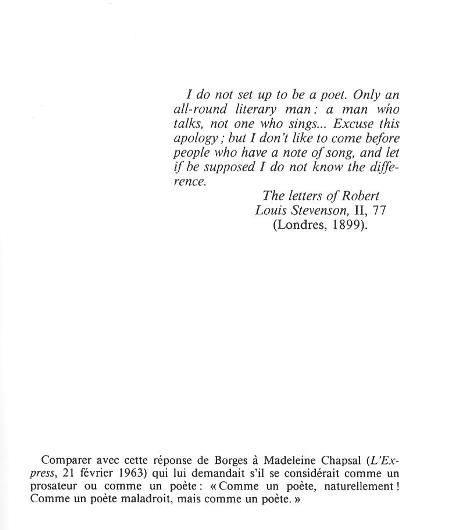
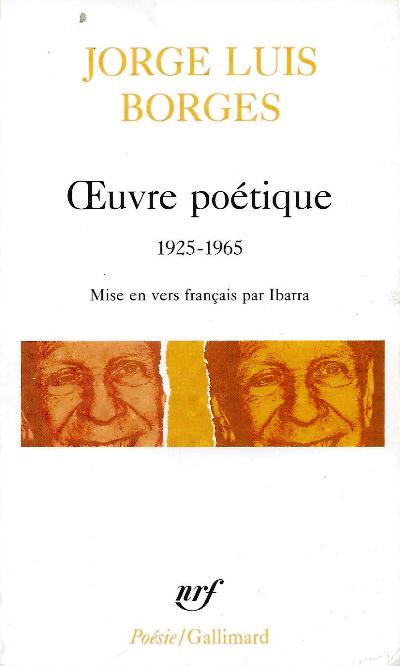
Nhân đây, xin tạ lỗi.
NQT
Câu của Borges, cũng được Norman Thomas Di Giovanni trích dẫn làm đề từ cho cuốn do ông biên tập và dịch thuật:
I do not set up to be a poet. Only an all-round literary man: a man who talks, not one who sings. . . . Excuse this little apology for my muse; but I don't like to come before people who have a note of song, and let it be supposed I do not know the difference.
The Works of Robert Louis Stevenson, Vailima Edition, XXII, 42 (London, 1923)
"Nói cho cùng,
tất cả chúng ta đều cố gắng là thi sĩ. mặc dù những
thất bại, tôi vẫn tiếp tục muốn là một thi sĩ."
Borges mở đầu buổi nói chuyện, cho một số sinh viên
tại đại học Columbia, vào mùa xuân năm 1971. Ông
lúc này đã mù, và phải nhờ đến người
bạn, và cũng là người chuyên dịch ông.
I do not set up
to be a poet. Only an all-round literary man: a man who talks, not one
who sings ... Excuse this apology .. but I don't like to come before people
who have a note of song, and let if be supposed I do not know the
difference.
The letters of Robert Louis Stevenson, II, 77
(Londres, 1899).
Tôi không
muốn làm nhà thơ.
Mà chỉ muốn làm một anh văn nghệ làng nhàng.
Một thằng nói, chứ không hát.
Xin lỗi vì đã trần tình như vậy, vì tôi
không muốn chường mặt ra trước 1 tay biết rành về hát, mà lại làm ra vẻ không
nhận ra sự khác biệt
L. S. Stevenson
Comparer avec cette réponse de Borges à Madeleine Chapsal (L'Express, 21 février 1963) qui lui demandait s'il se considérait comme un prosateur ou comme un poète: « Comme un poète, naturellement! Comme un poète maladroit, mais comme un poète. »
Và trả lời
Madeleine Chapsal (L'Express,
21 février 1963)
Là một nhà
thơ chứ, lẽ dĩ nhiên!
Một nhà thơ vụng,
nhưng một nhà thơ.
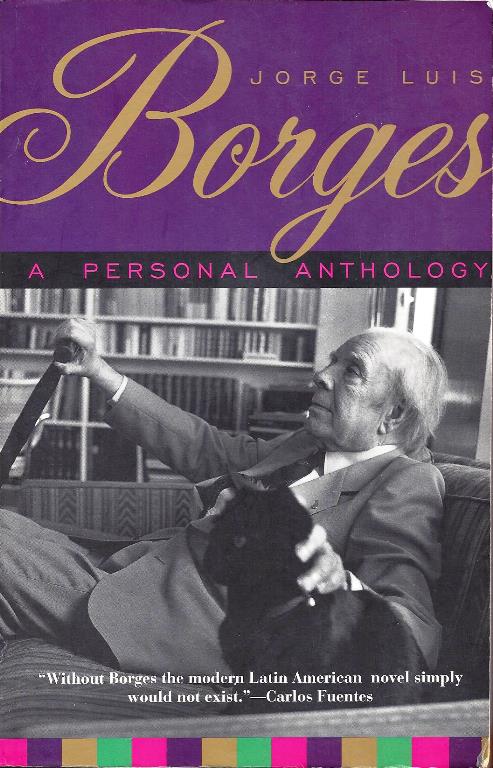
Cuốn này,
do Anthony biên tập và viết Tựa, cũng có 1 bản dịch
bài Golem.
Post ở đây, vả sẽ có bản tiếng Việt liền sau.
If (as the Greek asserts in the Cratylus)
The name is archetype to the thing,
The rose is in the letters of "rose"
And the length of the Nile in "Nile."
Thus, compounded of consonants and vowels,
There must be a terrible Name, which essence
Ciphers as God and Omnipotence
Preserves in consummate letters and syllables.
Adam, and the stars, knew it
In the Garden. The iron rust of sin
(Say the cabalists) has effaced it
And the generations have lost the word.
The artifices and candor of man
Are endless. We know that there came a day
On which the People of God sought the Name
In the vigils of the ghetto:
The memory is still green and vivid-
Not in the manner of other memories like
Vague shadows insinuated in a vague history-
Of Judah Lion, rabbi of Prague.
Burning to know what God knew,
Judah Leon gave himself up to permutations
Of letters and complex variations:
And at length pronounced the Name which is the Key,
The Portal, the Echo, the Host, the Palace,
Over a doll which, with torpid hands,
He wrought to teach the arcana
Of Letters, Time, and Space.
The simulacrum raised its heavy
Lids and saw forms and colors
It did not understand, lost in a din,
And attempted fearsome movements.
Gradually it saw itself (even as we)
Imprisoned in that sonorous net
Of Before, After, Yesterday, While, Now,
Left, Right, I, Thou, Those, Others.
(The cabalist who officiated as divinity
Called his farfetched creature "Golem":
These truths are related by Scholem
In a learned passage of his volume.)
The rabbi explained the universe to him
(This is my foot; this is yours; this, the rope)
And, after many years, taught the aberration
To sweep the synagogue, as best he might.
There must have been some error in graphics
Or in articulating the Sacred Name:
For despite the most bizarre wizardry
The apprentice man never learned to talk.
Its eyes-less a man's than a dog's,
And even less a dog's than a thing's-
Would follow the rabbi through the equivocal
Twilight of the dim unworldly retreat.
There was something too untoward in the Golem
For at his approach the rabbi's cat
Would hide. (This cat does not appear in Scholem
But I intuit it across all these years.)
Raising its filial hands to God
It copied the devotions of its god
Or, stupefied and smirking, it would bend
Into the concave salaams of the Orient.
The rabbi gazed fondly on his creature
And with some terror. How (he asked himself)
Could I have engendered this grievous son,
And left off inaction, which is wisdom?
Why did I decide to add to the infinite
Series one more symbol? Why, to 'the vain
Skein which unwinds in eternity
Did I add another cause, effect, and woe?
At the hour of anguish and vague light
He would rest his eyes on his Golem.
Who can tell us what God felt,
As He gazed on His rabbi in Prague?
-Translated by ANTHONY KERRIGAN
Trong The Last Interview, Borges cho biết The Golem là bài thơ ông mê nhất


Comments
Post a Comment